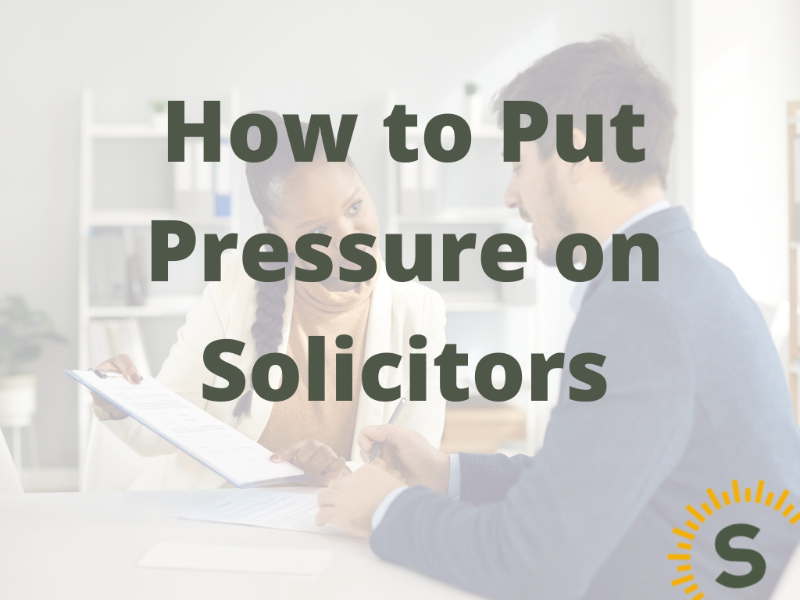
When it comes to the process of buying or selling a property, conveyancing often seems to be the most complex and slow-moving part. This procedure includes a series of legal and administrative tasks that need to be accomplished to ensure a smooth property transaction. However, it can be quite frustrating when conveyancing takes longer than expected.
In this insight, we will explain how to put pressure on solicitors to speed up the conveyancing process, offering useful insights and practical tips that can help you expedite your property transaction.
Before we delve into how to expedite the process, it's essential to understand why conveyancing can often seem slow. Conveyancing is not a straightforward process - it involves various legal procedures, documentation, and checks, all of which require time and meticulous attention to detail.
Solicitors play a crucial role in the conveyancing process. They are responsible for performing all the legal work involved in property transactions, preparing and reviewing contracts, and liaising with other parties such as mortgage lenders and estate agents. Solicitors also conduct property searches and handle the exchange of contracts and completion of the sale or purchase.
The speed of the conveyancing process can be influenced by several factors, some of which are out of solicitors' control:
If you feel that your conveyancing process is taking longer than it should, there are ways to apply pressure on your solicitor to speed things up. Here are a few strategies that can help:
Maintaining regular communication with your solicitor is crucial. Don't hesitate to check in with your solicitor on a weekly basis. This not only keeps you updated but also subtly applies pressure on them to keep things moving. However, remember that it's your solicitor's job to update you, so only reach out if you feel you're not getting the updates you need.
Setting a deadline for the conveyancing process can be an effective way to put pressure on your solicitor. This creates a sense of urgency and gives your solicitor a clear timeline to work towards. However, ensure that your deadline is realistic considering all the factors involved in your property transaction.
Your estate agent can be a valuable ally in speeding up the conveyancing process. They have a vested interest in getting the deal done and can check in with your solicitor regularly, reminding them of the urgency of the situation.
If you're buying a property with a mortgage, you can use this to your advantage. Mortgages have an expiration date, and the urgency to complete the conveyancing process before this date can help push your solicitor to work faster.
If your solicitor is still not picking up the pace despite your efforts, you might have to consider more drastic measures.
If your solicitor's performance is unsatisfactory, you have the right to complain. You can complain directly to your solicitor or escalate the complaint to the Legal Ombudsman. However, use this as a last resort, as it could strain your relationship with your solicitor.
If things are not improving, you can consider changing solicitors mid-process. While this might slow things down initially, it could speed up the process in the long run if your new solicitor is more efficient and responsive.
One of the best ways to avoid delays in the conveyancing process is to choose the right solicitor from the start. Here are a few tips to help you make the right choice:
While it's natural to want your property transaction to be completed as quickly as possible, it's important to understand that conveyancing is a complex process that requires time and diligence. However, by maintaining regular communication, setting clear deadlines, and choosing the right solicitor, you can put pressure on solicitors and help ensure a smoother and faster conveyancing process. Always remember, patience and proactive engagement are the keys to a successful property transaction.

Stuart is an expert in Property, Money, Banking & Finance, having worked in retail and investment banking for 10+ years before founding Sunny Avenue. Stuart has spent his career studying finance. He holds qualifications in financial studies, mortgage advice & practice, banking operations, dealing & financial markets, derivatives, securities & investments.
 No minimum
No minimum  Newcastle-under-Lyme, Staffordshire
Newcastle-under-Lyme, Staffordshire Free Consultations
Free Consultations
 No minimum
No minimum  Free Consultations
Free Consultations
 No minimum
No minimum  No obligation consultation
No obligation consultation
 No minimum
No minimum  Leyland, Lancashire
Leyland, Lancashire No obligation consultation
No obligation consultation
 No minimum
No minimum  No obligation consultation
No obligation consultation
 No minimum
No minimum  Free Consultations
Free Consultations
 No minimum
No minimum  No obligation consultation
No obligation consultation
 No minimum
No minimum  No obligation consultation
No obligation consultation
 No minimum
No minimum  Free Consultations
Free Consultations
 No minimum
No minimum  Free Consultations
Free Consultations
 No minimum
No minimum  Coatbridge, Lanarkshire
Coatbridge, Lanarkshire Initial or Ongoing Consultation Fees
Initial or Ongoing Consultation Fees
 No minimum
No minimum  Initial or Ongoing Consultation Fees
Initial or Ongoing Consultation Fees
 £21,000 +
£21,000 +  Initial fee free consultation
Initial fee free consultation
 London, Greater London
London, Greater London No obligation consultation
No obligation consultation
 No minimum
No minimum  Initial fee free consultation
Initial fee free consultation
 No minimum
No minimum  No obligation consultation
No obligation consultation
 No minimum
No minimum  No obligation consultation
No obligation consultation
 No minimum
No minimum  No obligation consultation
No obligation consultation
 No minimum
No minimum  Initial fee free consultation
Initial fee free consultation
 No minimum
No minimum  No obligation consultation
No obligation consultation
 No minimum
No minimum  Initial fee free consultation
Initial fee free consultation
 No minimum
No minimum  Initial or Ongoing Consultation Fees
Initial or Ongoing Consultation Fees
 No minimum
No minimum  Initial fee free consultation
Initial fee free consultation
 No minimum
No minimum  Free Consultations
Free Consultations
 £51,000+
£51,000+  Sheffield, South Yorkshire
Sheffield, South Yorkshire No obligation consultation
No obligation consultation





Our website offers information about financial products such as investing, savings, equity release, mortgages, and insurance. None of the information on Sunny Avenue constitutes personal advice. Sunny Avenue does not offer any of these services directly and we only act as a directory service to connect you to the experts. If you require further information to proceed you will need to request advice, for example from the financial advisers listed. If you decide to invest, read the important investment notes provided first, decide how to proceed on your own basis, and remember that investments can go up and down in value, so you could get back less than you put in.
Think carefully before securing debts against your home. A mortgage is a loan secured on your home, which you could lose if you do not keep up your mortgage payments. Check that any mortgage will meet your needs if you want to move or sell your home or you want your family to inherit it. If you are in any doubt, seek independent advice.